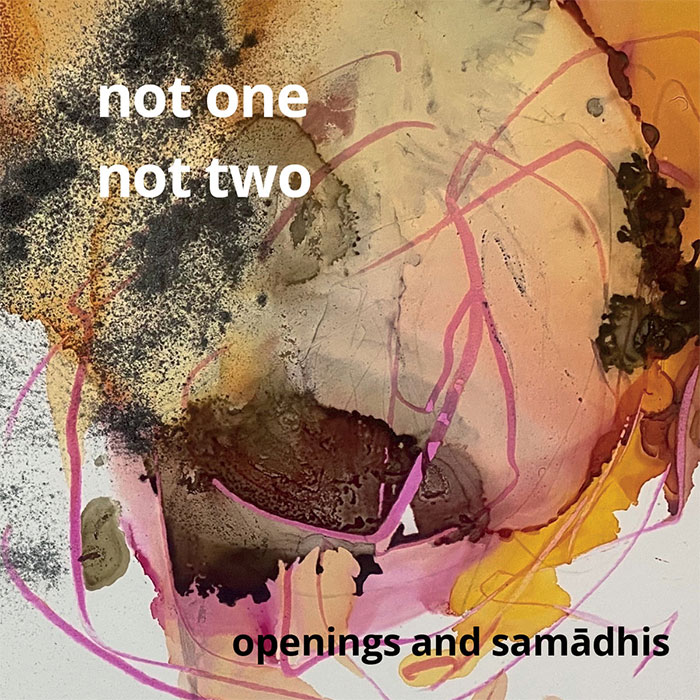
Openings and Samādhis, Not One Not Two (Discus Music)
In Openings and Samādhis, the latest Discus Music release, sax-players Geoff Bright and Hervé Perez have come together under the moniker Not One Not Two, a name which – along with the album-title – immediately directs us to their Buddhist credentials. Samādhi is a Sanskrit term for ‘oneness’, a state of deep concentration, of meditative absorption. The album takes as its starting-point the similarities between the discipline of meditation and that of free improvisation.
The title of the first track, ‘the samādhi of the expulsion of the sacred rage’, is particularly topical, I thought. You don’t have to be a Buddhist (and, as I feel I should point out, I don’t identify as a Buddhist myself) to appreciate what’s going on here. ‘Sacred rage’ arises not out of a desire for vengeance, but out of a sense of justice and a love of the sacred. The trouble is, its very sacredness can become a justification for holding onto it. So much of what is going on in the world right now, and one’s perceived powerlessness in the face of it, can go round and round in one’s head if one lets it. However, to submit to sacred rage, although it can feel as if it’s having the opposite effect, is to disempower ourselves. We only get to inhabit our heads on a fixed lease: we should make the most of it and not sublet any part of it, let alone allow our enemies control any of what goes on in it. And it’s an idea that, although not discussed explicitly, is very much in vogue, as evidenced by a recent headline – ‘Farage is Living Rent-Free in Starmer’s Head’ – in The New Statesman. To get back to the music though, although the whole thing here is couched in Buddhist terminology, one could rewrite the narrative in purely humanist terms, using everyday language, and it would still make perfect sense: to make this music, one has to clear one’s head of all the things it might otherwise be thinking about, however insistent those thoughts might be. And it might take a hit from bamboo stick (track 2) to shift them.
Buddhism talks of two arrows: the first, of unavoidable suffering, the second, which we inflict on ourselves, of our response to the first. We might blame ourselves, create narratives which only serve to make the situation worse. The ‘encounter with the double’ referenced in the title of the third track is the realisation that one is firing that second arrow at oneself. Rather than being caught up in the cycle of suffering, one seeks to sidestep it and respond instead to the first arrow with kindness. The result here is what was, on first listening, probably my favourite track on the album. Flurries of hyperactive musical thought attempt repeatedly to settle into a feeling of coherence. When they do, what we get is a slightly melancholy, lyrical duet with klezmer-like flattened seconds.
Other tracks deal with other concepts, but, as I’ve already said, you don’t have to be a Buddhist to appreciate what’s going on here. What we’re dealing with is quite simply eminently listenable improvised music! In his notes on the album, Geoff Bright draws parallels between the process of meditation and that of improvisation: as he says, ‘Paradoxically, as improvisers we prepare so very diligently for the moment of improvisatory flight and then, on entering it, immediately jettison all preparation. Why? Because we know that’s precisely where stuff really starts to happen, in that unconditional letting go. It may be very threatening to the everyday ego-self but it’s vital to improvisation.’ Later, he talks of recording the tracks here with Perez and how ‘as in meditation, we stayed with the endeavour of “neither pushing nor pulling” throughout and let everything land just as it was’. Reading this and listening, I was reminded of the Ten Bulls, a series of pictures with commentaries created by the Chinese master Kakuan in the twelfth century. The bull represents truth in action. The series illustrates the steps one takes towards the realisation of one’s true nature. The sixth, ‘Riding the Bull Home’, caught my eye. For flute, read sax:
Mounting the Bull, slowly I return homeward.
The voice of my flute intones through the evening.
Measuring with hand-beats the pulsating harmony, I direct the endless rhythm.
Whoever hears this melody will join me.
Openings and Samādhis is a sustained feat of imagination achieved with minimal resources. It’s fascinating, I think, to explore the background to it, but, whatever one’s philosophical take on it all, it would be an absorbing, meaningful experience even if one discovered it with no titles, artists or notes attached to it! Do have a listen.
.
Dominic Rivron
LINK
Openings and Samādhis – 204CD (2025):
https://discusmusic.bandcamp.com/album/openings-and-sam-dhis-204cd-2025
.
